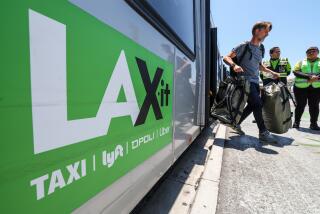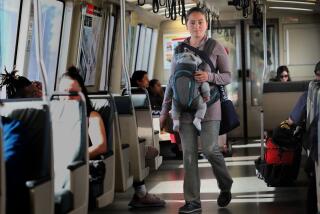Transportation Panel Boosts Its Ride Fund for Disabled
- Share via
SANTA ANA — A paraplegic woman was left stranded at her doctor’s office and a nurse had to take her home. A disabled man was told that if he stayed at work an extra hour, he would lose his usual ride.
Both were spurned recently by the county’s special transit service known as ACCESS because demand from the disabled is fast outstripping available vehicles and drivers.
“I find this offensive,” said Shelby Smith, an advocate for the disabled, who testified at a public hearing Monday before the Orange County Transportation Authority board.
After hearing that and similar complaints, the OCTA board voted to spend an extra $300,000 for additional taxicab service.
Without the boost in service, OCTA officials predicted that denials of trip requests would increase from 1% in October, 1993, to 17.7% by June, surpassing the federal limit of 17%.
The program is required by the Americans With Disabilities Act. In December it provided 16,100 trips out of 16,700 requested, a denial rate of 3.6%. The ACCESS fleet includes 36 vans and 14 taxicabs.
The dramatic increase predicted in denials is linked to skyrocketing awareness of the service among the disabled, Smith said.
However, the future improvement in service may come at a controversial cost, OCTA officials warned. To pay for it, the agency is proposing to eliminate by June, 1995, all door-to-door Dial-A-Ride service. Dial-A-Ride, a precursor to ACCESS, serves a much wider ridership, including seniors and some groups, including boys’ and girls’ clubs and Head Start.
What’s more, there’s a proposed fare hike on the table for ACCESS, from the current $1.50 per ticket to $2 as of July 1.
On the bright side, OCTA officials said, the agency is planning to move eligibility certification for the ACCESS program in-house, to avoid delays now encountered by having social service agencies screen customers.
Reaction to the proposed changes has been mostly positive, John Catoe, OCTA’s operations manager, said during Monday’s public hearing.
But there were some critical comments too.
For example, Mallory Vega, executive director of the Garden Grove seniors’ center, testified on behalf of 15 community centers that ending Dial-A-Ride service for those who aren’t disabled could pose insurmountable transportation problems for seniors.
“Door-to-door service is the only way we get many seniors to the centers,” Vega said. “We’ve had no increase in funding to be able to pay for this.”
Vega said Medi-Cal reimbursements for transit service haven’t increased in seven years, and those centers that receive some federal funds have experienced cutbacks.
Already, OCTA officials conceded, they’ve had to transfer eight vehicles from Dial-A-Ride service to ACCESS, resulting in a deterioration of Dial-A-Ride service and additional customer complaints.
Additional public comment will be sought, officials said, before Dial-A-Ride is eliminated or a fare hike is approved.
More to Read
Sign up for Essential California
The most important California stories and recommendations in your inbox every morning.
You may occasionally receive promotional content from the Los Angeles Times.













